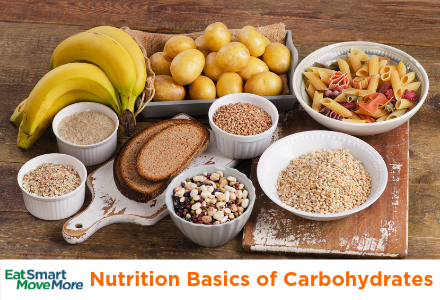In our previous post about the 6 Basic Nutrients, we gave a short description of the macronutrient carbohydrates. Today, we’ll go into more detail about carbs, their functions in the body, sources of carbohydrates, and some information about different diets that focus on carb intake.
Carbohydrate Recommendations
The Dietary Guidelines for Americans carbohydrate recommend 45-65% of calories from carbohydrates, with a minimum of 130 grams of carbs each day.
Fiber recommendations are 21-25 grams per day for women and 30-38 grams per day for men, with older people aiming for the lower end and younger people aiming for the higher end.
The newest version of the Dietary Guidelines established a limit of 10% of calories from added sugar, a type of carbohydrate in foods we should limit. For a standard 2,000 calorie diet, this amounts to less than 50 grams of added sugar per day.
Most Americans easily meet the carbohydrate recommendations, but are getting too much added sugars and not enough fiber. Switching to more whole grains and eating enough fruits, vegetables, and plant-based protein foods can help increase fiber, while these strategies can help reduce added sugar in your diet.
Sources of Carbohydrates
Carbohydrates are in most foods – fruits, vegetables, grains, nuts, seeds, and dairy products. All of the five MyPlate food groups are good sources of carbohydrates (since beans, nuts, and seeds are in the protein foods group even though meat doesn’t have carbs). The different types of carbohydrates have different effects on our digestion and health.
Complex Carbohydrates – Also known as starches, complex carbohydrates are made of multiple sugars bonded together. Our bodies have to break down these carbohydrates 1 sugar at a time. This means complex carbohydrates take longer to digest and raise blood sugar more slowly.
Simple Carbohydrates – Simple sugars are sweet and quickly digested, which raises blood sugar faster. Simple sugars can be found in whole foods, like lactose in milk or fructose in fruit. Simple sugars can also be added to foods, like table sugar, high fructose corn syrup, or honey in recipes or processed foods.
Fiber – Fiber is a special type of complex carbohydrate that our bodies cannot digest. But that doesn’t mean they aren’t important in our diets! There are two main types of fiber, soluble and insoluble, based on how they interact with water. Insoluble fiber does not dissolve in water in our guts and provides bulk to promote bowel movement regularity. Soluble fiber absorbs water, increasing feelings of fullness, slowing digestion, and keeping blood sugar from rising too quickly. They also bind cholesterol and fatty acids in the intestines, which can help remove them from the body and improve heart health.

Carbs are fuel for your body!
Function of Carbohydrates in Our Bodies
- Your body runs on blood glucose for fuel. Dietary carbohydrates are the main source of blood glucose.
- Complex carbohydrates and fiber slow digestion and help control blood sugar. They also increase feelings of fullness for weight management.
- Fiber promotes gut health. It helps “sweep” the intestines, eliminating waste. It promotes bowel regularity. Fiber also is an important food source for helpful intestinal microorganisms that aid digestion and support a strong immune system.
- Fiber promotes heart health. By binding cholesterol, fiber removes cholesterol from the body and helps manage cholesterol levels.
- Diets high in fiber can protect against certain cancers, like colorectal cancer.
Effect of Carbohydrates in Different Diets
We’ve already talked about a low-carb, high-fat or keto style diet in our Fats post. There are two diets for preventing heart disease that use fiber to improve health. The Dietary Approaches to Stop Hypertension (DASH) Diet and Therapeutic Lifestyle Changes (TLC) Diet both encourage higher fiber.
The DASH Diet recommends a MyPlate-style eating pattern with emphasis on whole grains, fruits, vegetables, nuts, and seeds, which are all rich in both soluble and insoluble fiber. The DASH Diet has been shown to lower blood pressure and cholesterol, which reduces the risk of heart disease. The TLC Diet recommends adding 5-10 grams of soluble fiber a day as part of a MyPlate-style eating pattern for lowering cholesterol and heart disease risk. You may remember commercials for oats and oatmeal from back in the day touting their cholesterol lowering abilities because oats are a great source of soluble fiber. Beans, other whole grains, psyllium husks, fruits, and vegetables are all good sources of soluble fiber, too.
Fiber has also been found to assist with weight management. Fiber is filling, slows digestion, and helps control blood sugar swings, making it useful for reducing calories without feeling deprived.
Carbohydrates are one of the three major sources of energy in our diets. Carbohydrate-rich foods should be a large portion of your diet because carbs are the body’s preferred source of fuel and fiber has many important health benefits. Do you have any questions about carbohydrates, what it does in the body or how it fits into your diet?

